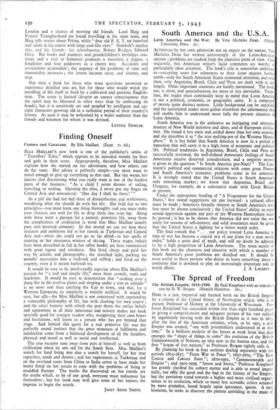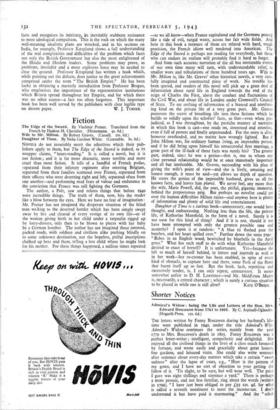The Spread of Freedom
HERE is a just, impartial and learned book on the British Empire by a citizen of the United States, of Norwegian origin, who is at present Professor of History at the University of Wisconsin. Pro- fessor Knaplund has succeeded within less than eight hundred pages in giving a comprehensive and adequate picture of his vast subject by ingeniously starting with the British Empire as it was in 1815, after the loss of the American colonies, when, as he says, a new Empire was created, " one with potentialities undreamed of at that time." In a brilliant analysis of the forces at work from-that date emerges the " shape of things to come" the evolution of the British Commonwealth of Nations, an idea new to the human race, and the first " league of free nations," as Professor Brogan rightly Calls it. By planning his book in four sections dealing separately with the periods 1815-1837, " From War to Peace "; 1837-1870, " The New Course and Laissez Faire "; 1870-1901, " Commonwealth and Empire " ; and 1901-1939, " Storm and Stress," Professor Knaplund has greatly clarified his subject matter and is able to reveal impar- tially, not ofily.the good and the bad in the history of the Empire, but the persistent trend towards a higher and more civilised organi- sation in its evolution, which so many less scientific critics actuated by mere prejudice, based largely upon ignorance, ignore. A true historian, he seeks to discover the pattern unfolding in the maze of
facts and recognises its intricacy, its inevitably stubborn resistance to mere ideological compulsion. This is the rock on which the many well-meaning idealistic plans are wrecked, and in his sections on India, for example, Professor Knaplund shows a full understanding of the real complexities and difficulties of the problem which faces not only the British Government but also the most enlightened of the. Hindu and Moslem leaders. Some problems may prove, as problems, insoluble and a more explosive force may be needed to clear the ground. Professor Knaplund has written a book which, while pointing out the defects, does justice to the great achievements comprised under the term "The British Empire." He has been lucky in obtaining a masterly introduction from professor Brogan, who emphasises the importance of the .representative institutions which Britain spread throughout her Empire, and for which there was no other source—a fact too often forgotten. This important book has been well served by the publishers with clear legible type



























 Previous page
Previous page